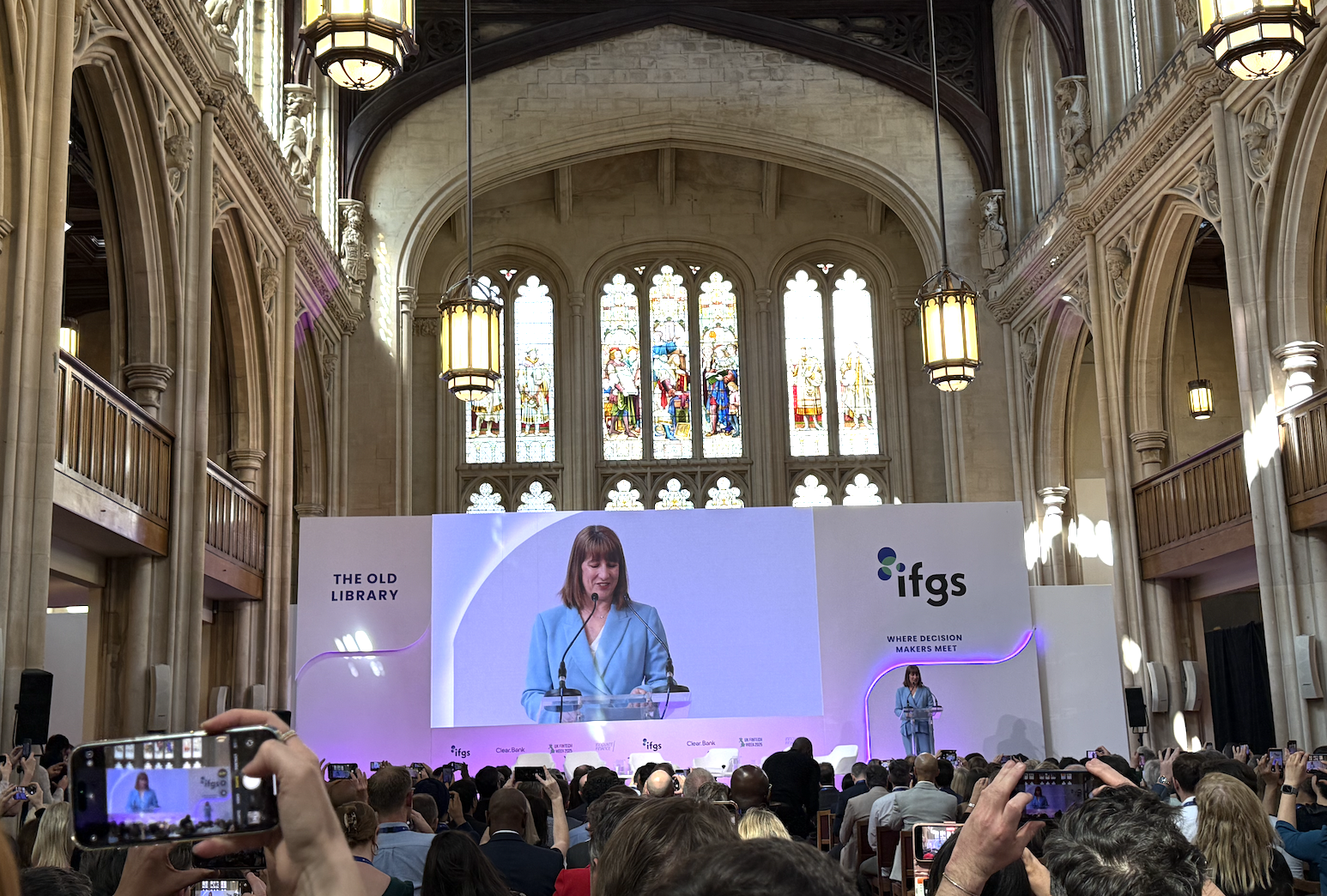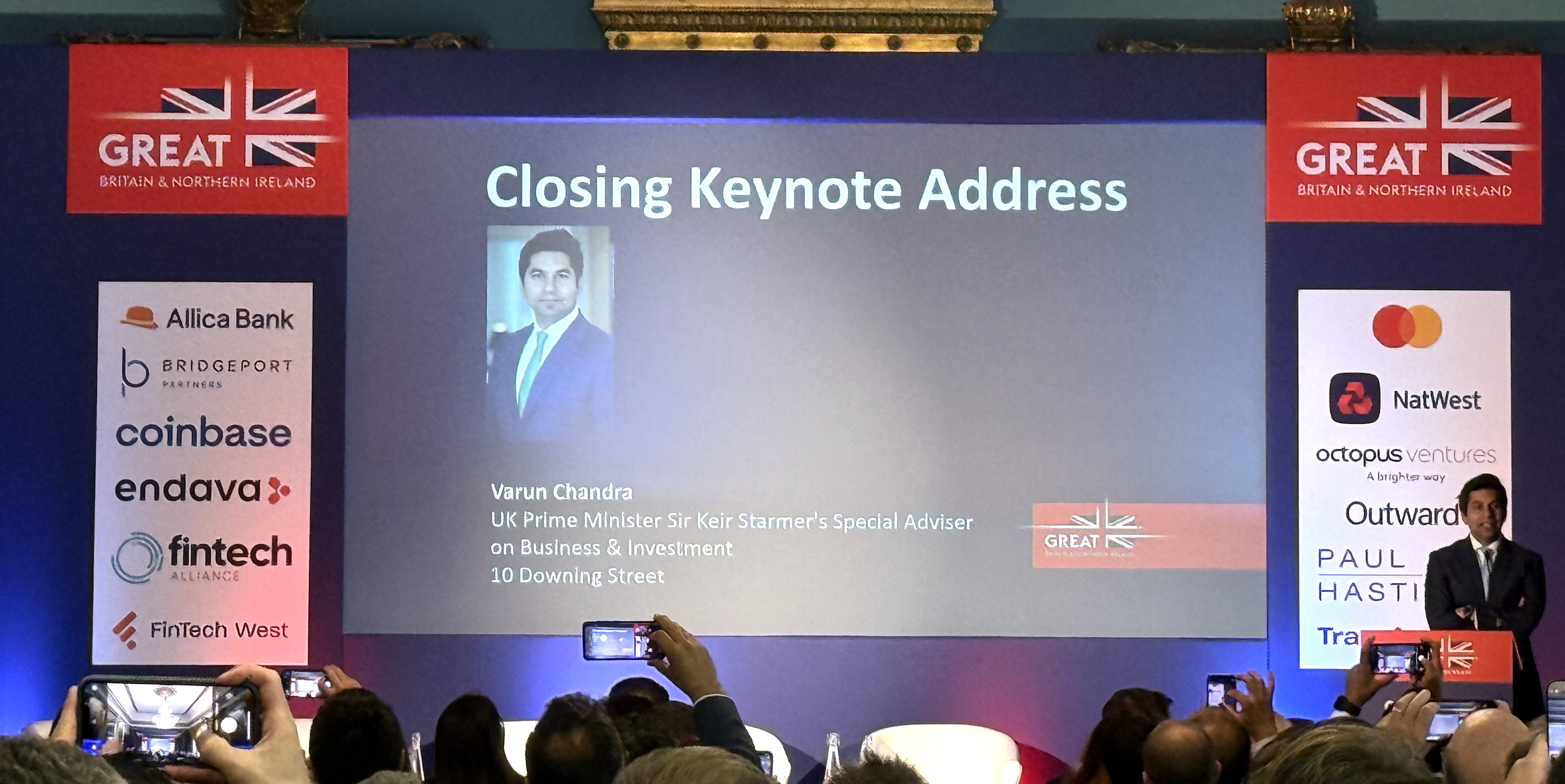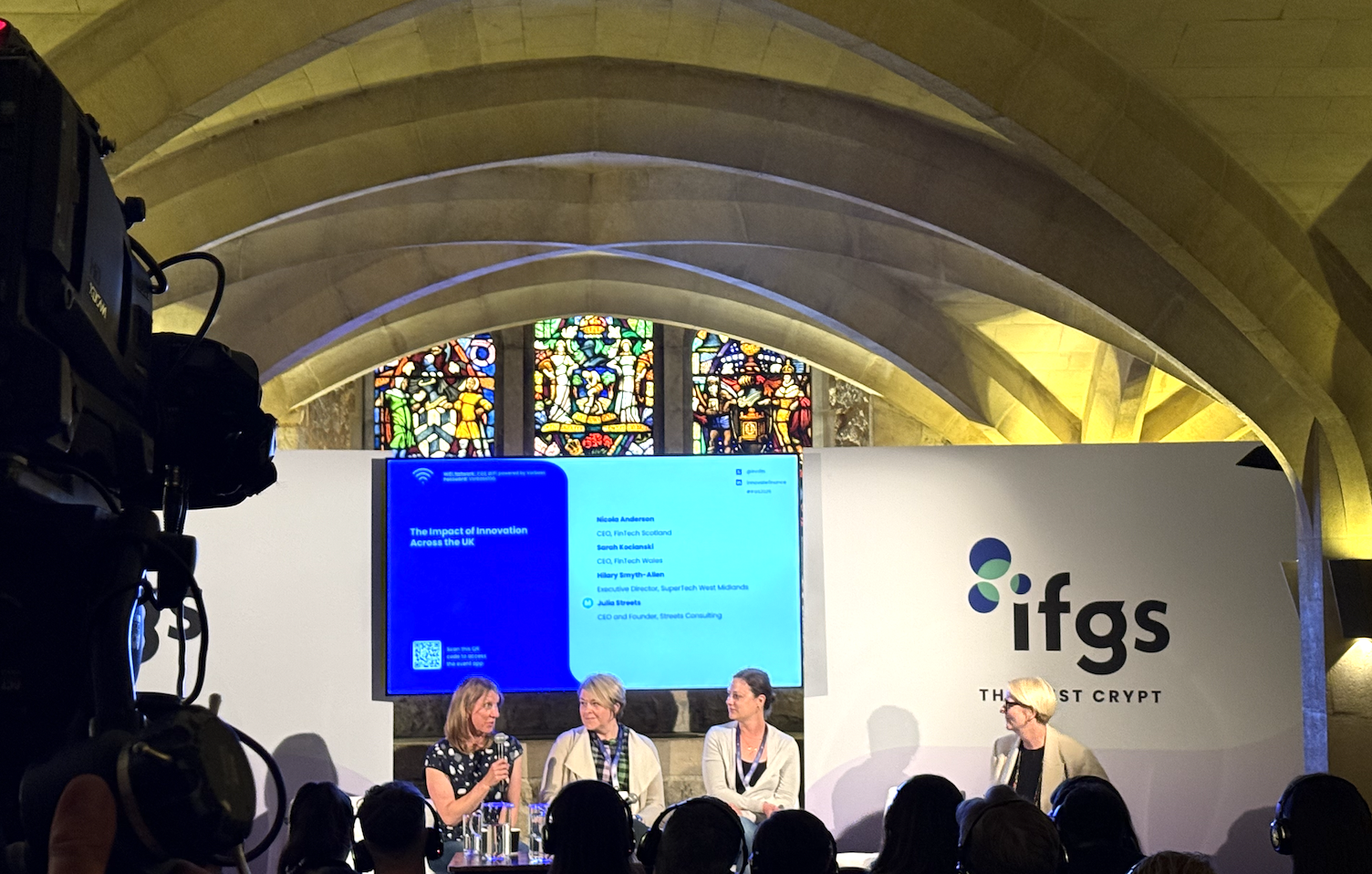 Last week was UK FinTech Week, which I always consider to be a pivotal week in the year and an excellent time to gauge the mood in the sector. It’s also a week that serves as a focal point for the FinTech sector, drawing visitors from across the globe and also provides a valuable opportunity to catch up with people from across the regions and nations of the UK. With the economy in a difficult phase, this year’s FinTech Week was always going to particularly interesting.
Last week was UK FinTech Week, which I always consider to be a pivotal week in the year and an excellent time to gauge the mood in the sector. It’s also a week that serves as a focal point for the FinTech sector, drawing visitors from across the globe and also provides a valuable opportunity to catch up with people from across the regions and nations of the UK. With the economy in a difficult phase, this year’s FinTech Week was always going to particularly interesting.
It felt like there was a more significant focus on international trade than ever, perhaps because the week kicked off with DBT’s Global FinTech Forum, and event that was heavily oversubscribed and was standing room only at times and featured speakers from around the world, as well as key UK figures from FinTech brands including Modulr, TrueLayer and Allica Bank, in addition to a fireside chat between Nikhil Rathi, CEO of the FCA, and Charlotte Crosswell, Chair of CFIT. It was great to see the FinTech National Network represented on the agenda by FinTech Scotland and FinTech Wales. The FinTech Times did a great write up of this event here.

FinTech West’s was a partner for this event and enjoyed some high profile brand exposure, in advance of a successful event in Bristol later in the week, hosted in partnership with DBT, which has been written up on the FinTech West website.
My favourite quote from the Global FinTech Forum came from one of the panel chairs, who said:
“Some people say you should learn from your mistakes. I don’t agree, I’d rather learn from the mistakes of others.”
This certainly amused me at the time, but they were quite right of course, and absorbing the expert insights at industry events is an excellent way to learn from others and make better decisions yourself.
The second day saw the flagship event of the week, Innovate Finance’s Global Summit (IFGS), which this year was condensed into a single jam packed day hosted at the iconic Guildhall in heart of the City of London. Innovate Finance have published their review of the day, and I felt this piece on Maddyness captured the mood particularly well, especially this paragraph:
“The Shift from Talk to Action? This year’s IFGS marked a notable shift in tone. Gone was the performative optimism of previous years — replaced by a more urgent, outcomes-focused dialogue. Across sessions and side-conversations alike, the message was clear: it’s time to move from positioning to implementation.”
An increased focus on impact is certainly a theme of conversations at FinTech North of late, and it was great to see the team host a stand for the second consecutive year, this time in partnership with MIDAS, Manchester’s inward investment agency.
Whitecap was proud to be on the agenda again this year, once again teaming up with Streets Consulting following our Scaling Regional FinTech report launch in 2024. This year our session focused on future innovation, and kicked off with a joint slot where I joined Stephen Browning of Innovate UK and we shared the outputs of our recent AI for Services 2025 report, in a discussion chaired by Julia Streets. I was representing Whitecap, FinTech North and FinTech West, and the second half of the session featured a panel made up of Sarah Kocianski (CEO, FinTech Wales), Hilary Smyth-Allen (Executive Director, SuperTech WM), Nicola Anderson (CEO, FinTech Scotland).

 A highlight of the day was an address from the Chancellor, Rachel Reeves, who confirmed the Government’s support for the FinTech sector and spoke about the importance of appropriate regulation, stating that “backing the builders” in FinTech can improve outcomes for businesses and consumers, and highlighting the importance of regulation, which she said “must support business, not hold it back.”
A highlight of the day was an address from the Chancellor, Rachel Reeves, who confirmed the Government’s support for the FinTech sector and spoke about the importance of appropriate regulation, stating that “backing the builders” in FinTech can improve outcomes for businesses and consumers, and highlighting the importance of regulation, which she said “must support business, not hold it back.”
Janine Hirt, CEO at Innovate Finance, said in her keynote at IFGS that the future of FS will be driven by 3 technologies:
- AI
- Smart Data
- Blockchain
As Stephen Browning and I each reflected on in our afternoon panel discussion, the key enabler for all of this is data, and this is where firms must focus their efforts if they are to realise the benefits that digital technology can bring.
 Some of the headline stats that were shared over the course of the week highlighted why the FinTech sector continues to be at the forefront of the UK Government’s growth aspirations and features strongly in the initial thinking around the Modern Industrial Strategy:
Some of the headline stats that were shared over the course of the week highlighted why the FinTech sector continues to be at the forefront of the UK Government’s growth aspirations and features strongly in the initial thinking around the Modern Industrial Strategy:
- UK FinTech has an estimated Gross Value Added (GVA) of £8.3bn*
- Productivity in the sector is 60% higher than the UK average.
- The GVA per employee of the sector is approximately 1.5 times higher than the average across the whole UK economy
- The UK is second only to the US in terms of FinTech investment
- One third of UK FinTechs are based outside London
- A third of all UK tech unicorns are FinTech firms
* Note: this figure comes from our very good friends at The Data City and relates to the GVA of FinTech firms – not the wider contribution by financial services firms, so the overall number is considerably higher)
 At Whitecap, we’re always interested in data and insight (it’s the key ingredient of our market reports), we’ll certainly be aiming to continue to play our role in the development of the sector, via our client work and our frequent regional and national reports on the sector. Our next report will focus on the North of England, a project we’re about to announce – get in touch if you’d like to be involved).
At Whitecap, we’re always interested in data and insight (it’s the key ingredient of our market reports), we’ll certainly be aiming to continue to play our role in the development of the sector, via our client work and our frequent regional and national reports on the sector. Our next report will focus on the North of England, a project we’re about to announce – get in touch if you’d like to be involved).
Aside from our reports, our core strategy consulting work spans projects relating to the modernisation of established financial services, the application of new technology, education and future skills requirements, development plans for local government / inward investment organisations, and commercial due diligence for investors. Amidst this activity, I find get asked about what Whitecap specifically does to support FinTech firms themselves, as it is not always apparent from our reports and other client work. The answer is that we help ambitious FinTech firms on a range of fronts, including:
- Developing a structured growth / development strategy, to enhance commercial performance
- Proposition development / positioning to drive engagement with established FS organisations
- Supporting the investment fundraising process, by helping develop growth plans and investor introductions (we work with investors to help them evaluate growth strategies of FinTech firms on investments of £1-15m)
- Creating engagement and profile opportunities via the numerous regional FinTech ecosystems we are involved in (eg FinTech North, FinTech West, FinTech National Network)
- Providing insights into regional opportunities outside London, via the FinTech ecosystem reports and events we are involved in
- Conducting market research and analysis to enable the creation of thought leadership content, to support marketing and development activity
- Supporting international FinTech firms with UK market entry / growth planning
We’re proud of the role we play as part of the UK’s dynamic, multi-dimensional and ever evolving FinTech sector, and we’re committed to continue to support the growth of FinTech in the UK and beyond.
Finally, I’ll close this blog with a quote from one of the speakers at the Global FinTech Forum responding to a question from the chair of his panel:
“That’s a brilliant question. It’s not the one that was on the briefing note though.”
Well, we wouldn’t want FinTech events to be boring and predictable would we?!
On a serious note, I suspect the business leaders in the FinTech sector will need to respond dynamically and decisively to whatever challenges that are thrown at them on a regional, national and international basis over the coming months.

If you’d like to discuss this blog post or share your own perspective on the issues covered, please get in touch or tag us in a comment or post on LinkedIn
Established in 2012, Whitecap Consulting is a regional strategy consultancy headquartered in Leeds, with offices in Manchester, Milton Keynes, Birmingham, Bristol and Newcastle. We typically work with boards, executives and investors of predominantly mid-sized organisations with a turnover of c£10m-£300m, helping clients analyse, develop and implement growth. We work across a range of sectors including financial services and technology, and with a specialism in fast moving high growth sectors, such as FinTech and LegalTech.